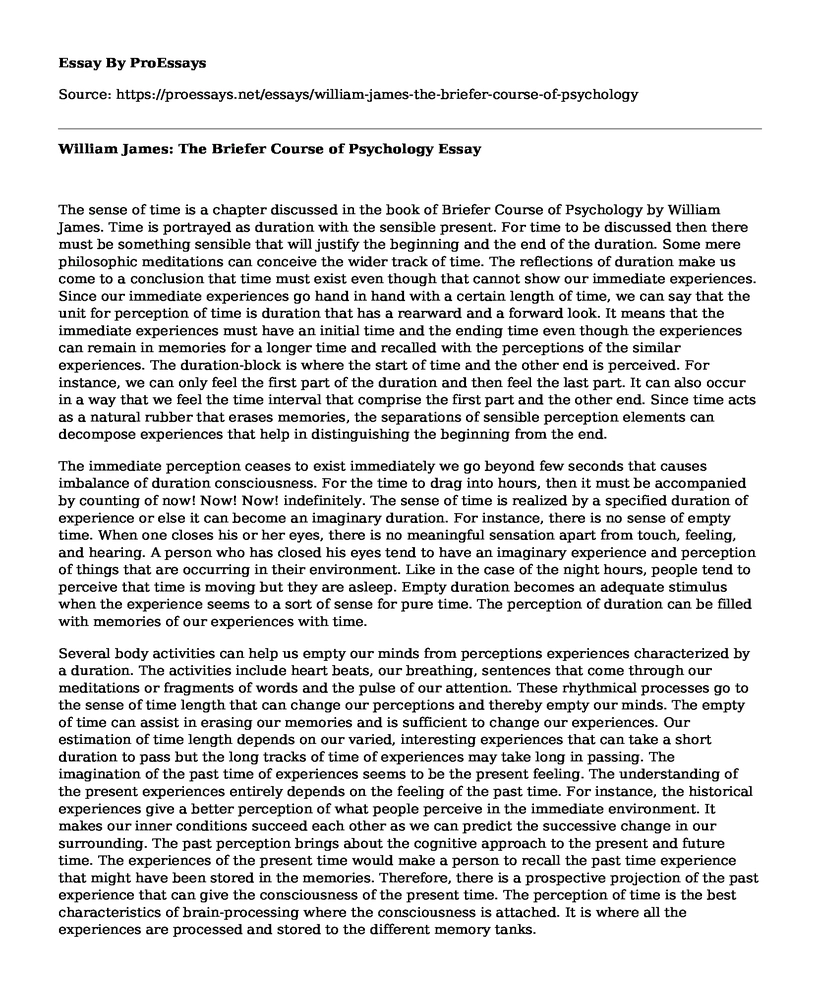The sense of time is a chapter discussed in the book of Briefer Course of Psychology by William James. Time is portrayed as duration with the sensible present. For time to be discussed then there must be something sensible that will justify the beginning and the end of the duration. Some mere philosophic meditations can conceive the wider track of time. The reflections of duration make us come to a conclusion that time must exist even though that cannot show our immediate experiences. Since our immediate experiences go hand in hand with a certain length of time, we can say that the unit for perception of time is duration that has a rearward and a forward look. It means that the immediate experiences must have an initial time and the ending time even though the experiences can remain in memories for a longer time and recalled with the perceptions of the similar experiences. The duration-block is where the start of time and the other end is perceived. For instance, we can only feel the first part of the duration and then feel the last part. It can also occur in a way that we feel the time interval that comprise the first part and the other end. Since time acts as a natural rubber that erases memories, the separations of sensible perception elements can decompose experiences that help in distinguishing the beginning from the end.
The immediate perception ceases to exist immediately we go beyond few seconds that causes imbalance of duration consciousness. For the time to drag into hours, then it must be accompanied by counting of now! Now! Now! indefinitely. The sense of time is realized by a specified duration of experience or else it can become an imaginary duration. For instance, there is no sense of empty time. When one closes his or her eyes, there is no meaningful sensation apart from touch, feeling, and hearing. A person who has closed his eyes tend to have an imaginary experience and perception of things that are occurring in their environment. Like in the case of the night hours, people tend to perceive that time is moving but they are asleep. Empty duration becomes an adequate stimulus when the experience seems to a sort of sense for pure time. The perception of duration can be filled with memories of our experiences with time.
Several body activities can help us empty our minds from perceptions experiences characterized by a duration. The activities include heart beats, our breathing, sentences that come through our meditations or fragments of words and the pulse of our attention. These rhythmical processes go to the sense of time length that can change our perceptions and thereby empty our minds. The empty of time can assist in erasing our memories and is sufficient to change our experiences. Our estimation of time length depends on our varied, interesting experiences that can take a short duration to pass but the long tracks of time of experiences may take long in passing. The imagination of the past time of experiences seems to be the present feeling. The understanding of the present experiences entirely depends on the feeling of the past time. For instance, the historical experiences give a better perception of what people perceive in the immediate environment. It makes our inner conditions succeed each other as we can predict the successive change in our surrounding. The past perception brings about the cognitive approach to the present and future time. The experiences of the present time would make a person to recall the past time experience that might have been stored in the memories. Therefore, there is a prospective projection of the past experience that can give the consciousness of the present time. The perception of time is the best characteristics of brain-processing where the consciousness is attached. It is where all the experiences are processed and stored to the different memory tanks.
In conclusion of the sense of time is characterized by duration. Reproduction of memories always has time of sense and sensible experiences. Some mere philosophic meditations can conceive the wider track of time. The reflections of duration make us come to a conclusion that time must exist even though that cannot show our immediate experience. The immediate perception ceases to exist immediately we go beyond few seconds the causes imbalance of duration consciousness. Several body activities can help us empty our minds from perceptions experiences characterized by a duration. The experiences of the present time would make a person to recall the past time experience that might have been stored in the memories. Psychologically it is the time that determines the peoples ability to carry out various activities. For instance, the immediate experiences are enabled by the shortest durations. The perception of time also relies of the rhythmical activities such as heart beats, our breathing, sentences that come through our meditations or fragments of words and the pulse of our attention.
Cite this page
William James: The Briefer Course of Psychology. (2021, Mar 11). Retrieved from https://proessays.net/essays/william-james-the-briefer-course-of-psychology
If you are the original author of this essay and no longer wish to have it published on the ProEssays website, please click below to request its removal:
- Essay on Child and Adolescent Development
- Essay Sample on Helping Kids Succeed
- Essay on Old Age Disorders: A Study of Dementia and Beyond
- Essay Sample on Parents of Autistic Children: Perceptions and Use of Supplemental Treatments
- Essay on Panic Disorder Prevalence in Primary Care: Addressing Mental Health Needs
- Unfamiliar Couplings: Robert Hass's Tale of Love and Caution - Essay Sample
- Essay Example on Hamlet and Oedipus: Literary Classics Relevant Today







